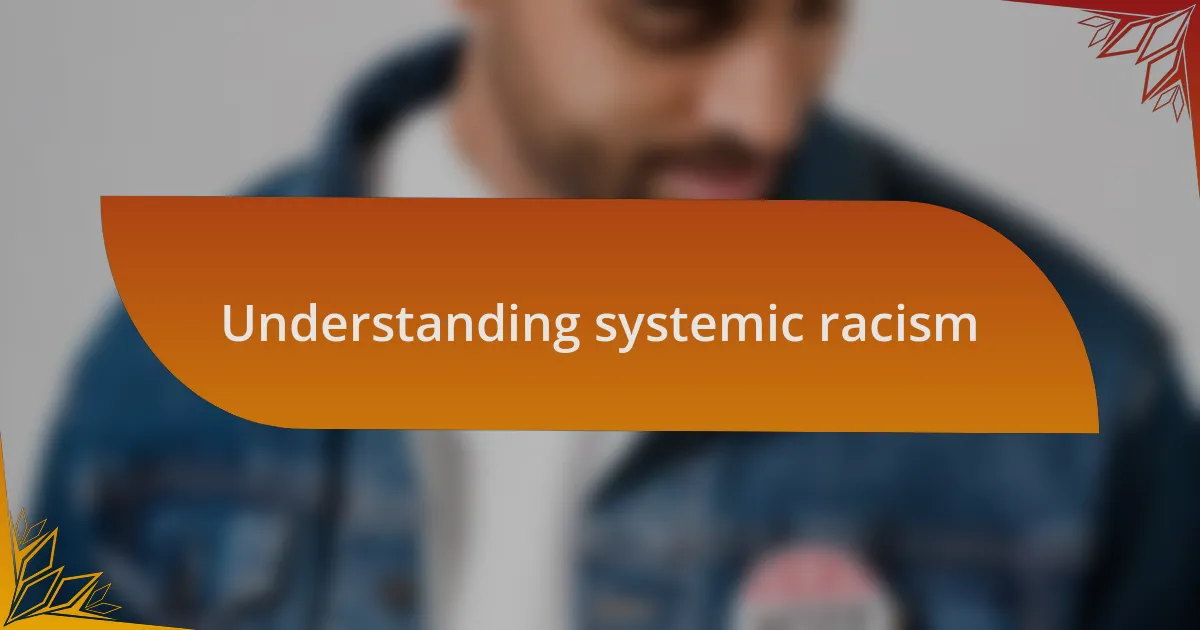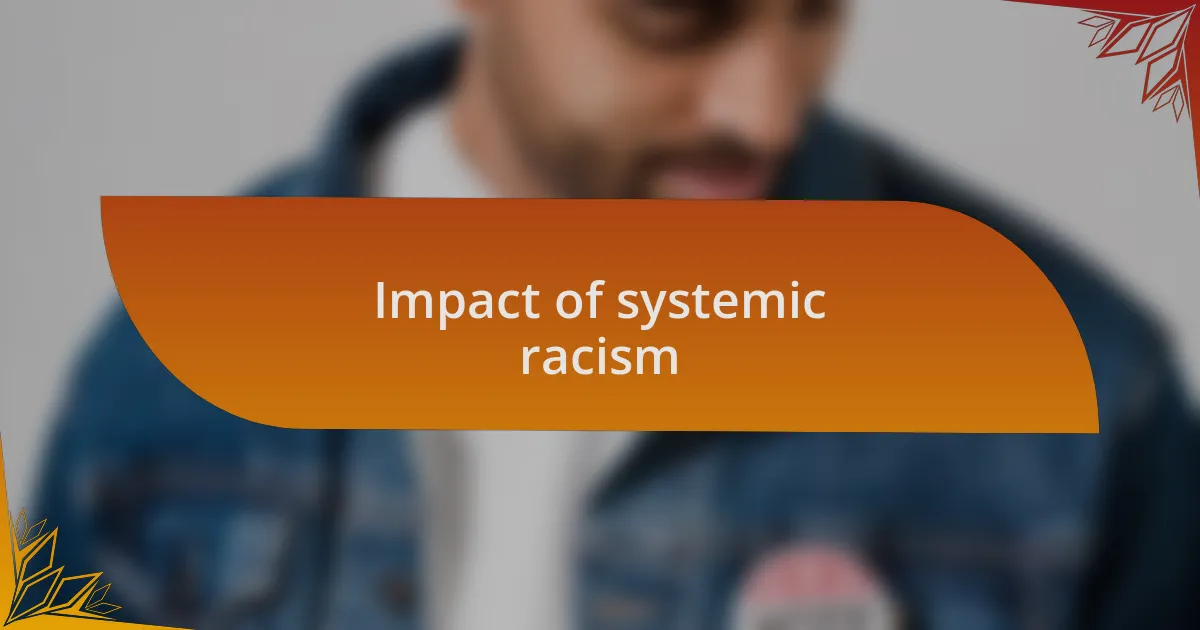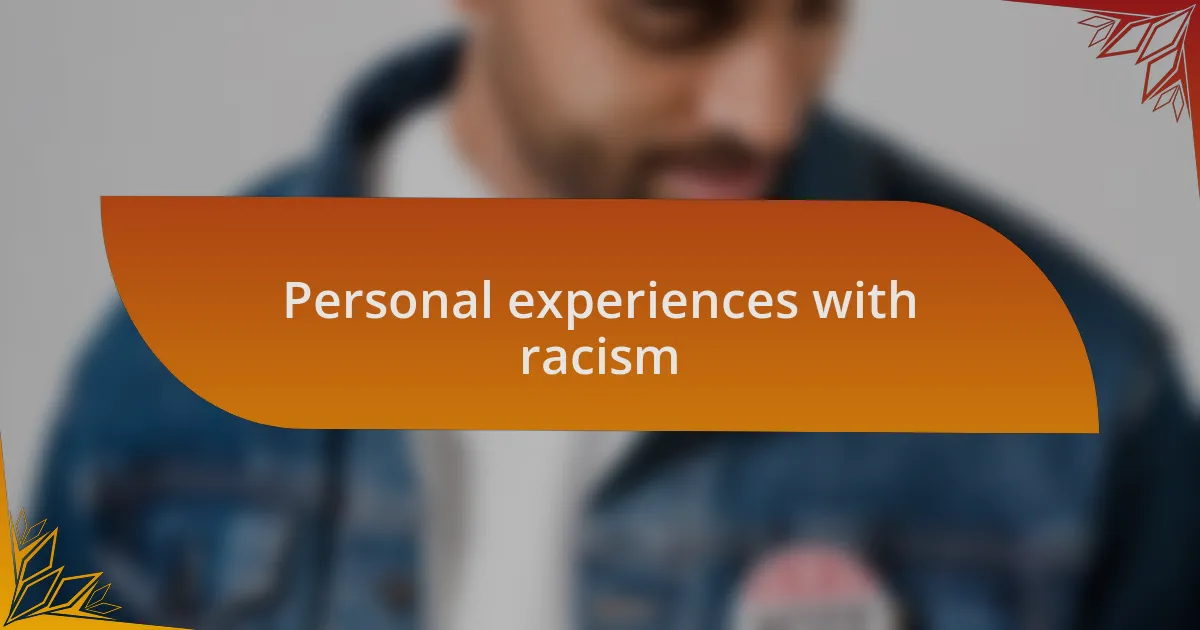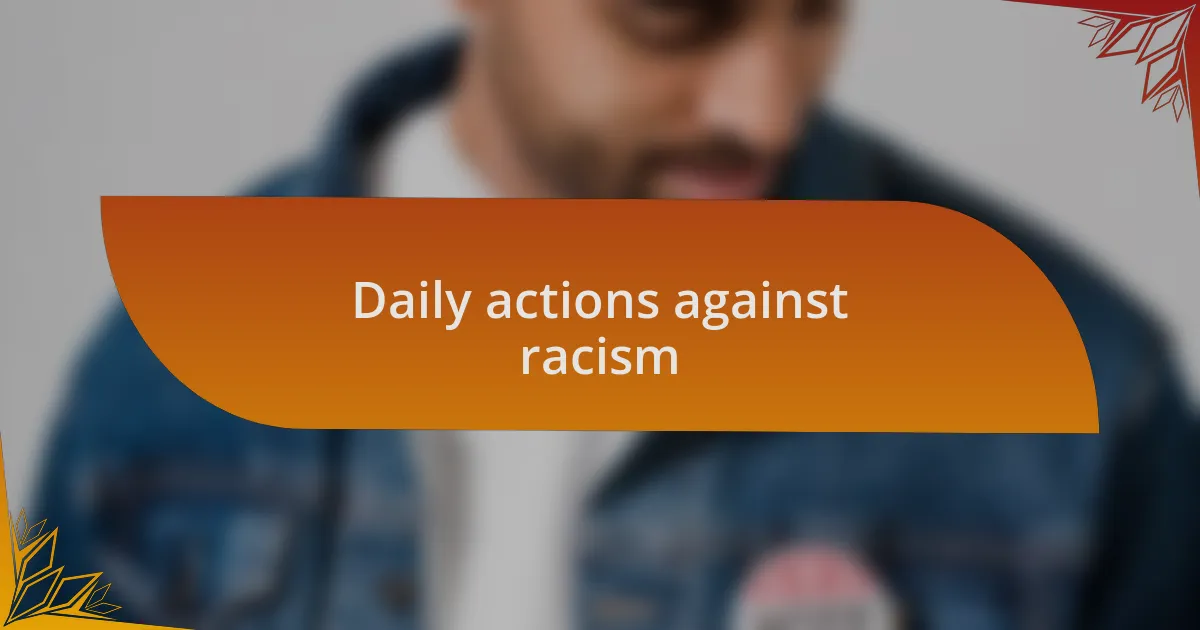Key takeaways:
- Systemic racism affects various institutions and generates disparities in opportunities, health care, and education based on race.
- Reparations are proposed as a means to address historical injustices, focusing on moral obligations, economic disparities, and avenues for healing.
- Personal experiences with racism reveal its subtle but impactful presence in everyday interactions and the workplace.
- Building a diverse support network is essential for fostering understanding, solidarity, and collective action against systemic racism.

Understanding systemic racism
Systemic racism is like a complex web that permeates various institutions and social systems, from education to employment. It’s not always visible; sometimes it lurks beneath the surface, subtly shaping outcomes for individuals based on race. I remember a colleague sharing how he faced challenges in advancing his career despite having the same qualifications as his peers. Can you imagine the frustration of working twice as hard but still feeling the weight of an invisible barrier?
When I think of systemic racism, I reflect on times when I saw decisions made that favored certain groups, often leaving others at a disadvantage. It’s this ingrained bias that can influence policies and practices, often without anyone really realizing it. Have you ever noticed how certain neighborhoods receive more investment and attention than others? That disparity isn’t just chance; it’s a reflection of longstanding inequities that are deeply rooted in our society.
Understanding systemic racism requires looking beyond individual actions to see how historical injustices shape present circumstances. For instance, when I learned about the redlining practices that denied home loans to people of color, it was eye-opening. How do we confront a system that feels so entrenched? Recognizing that these systems exist is the first step towards advocating for the changes necessary to dismantle them.

Impact of systemic racism
The impact of systemic racism is profound and often devastating, shaping the opportunities available to individuals across generations. I remember a distressing moment when a friend revealed how her education was undervalued—she attended a well-regarded school, yet her teachers often offered less encouragement than they did to her white classmates. How do we reconcile such disparities in a system that claims to provide equal opportunity for all?
On a broader scale, systemic racism affects access to health care, resulting in significant disparities in health outcomes. I witnessed this firsthand when a family member struggled to receive adequate treatment for a chronic illness. The lack of resources in their community meant they often had to settle for subpar care, highlighting a reality that many face daily. It’s heartbreaking to think that race can dictate the quality of care one receives—how can that be justified?
Moreover, the psychological toll of systemic racism cannot be understated. I recall feeling an overwhelming sense of helplessness when faced with situations that universally privilege one group over others. The constant fight against an unfair system can lead to mental fatigue, impacting one’s self-worth and aspirations. Isn’t it disconcerting to know that the stress of systemic inequalities persists just beneath the surface of our everyday lives?

Introduction to reparations politics
Reparations politics seeks to address the historical injustices and ongoing inequalities that have stemmed from systemic racism. I find it critical to recognize that these discussions are not merely theoretical; they touch on real lives and real grievances. How can we ignore the pain of past generations when it still echoes in the present?
In my experience, encountering reparations politics often opens up difficult conversations about accountability and responsibility. A friend once challenged me to consider what our society truly owes those who have been systematically disadvantaged. It was a thought-provoking moment that led me to appreciate the complexity and urgency surrounding the topic—can we really heal as a society without acknowledging and rectifying past wrongs?
The notion of reparations extends beyond financial compensation; it encompasses recognition, restorative justice, and policy change aimed at dismantling the structures that uphold inequality. I remember attending a community forum where individuals shared their stories of loss and struggle due to systemic injustice. Hearing firsthand accounts of such profound hurt moved me to wonder—what steps can we take to ensure that these voices are amplified and that meaningful change occurs?

Key arguments for reparations
One key argument for reparations is rooted in the idea of justice and accountability. For me, it brings to mind a specific conversation I had with a local activist, who eloquently described reparations as a moral obligation—something society must confront if it truly values fairness. How can we look at the disparities in wealth, education, and health and not see a direct line back to historical injustices? This responsibility to right the wrongs of the past feels like an essential step toward a more equitable future.
Another important point centers on acknowledging the economic disparities that systemic racism has perpetuated. When I think about my own community, I remember the stark differences in funding for schools in predominantly Black neighborhoods compared to those in predominantly white areas. It raises the question—how can we expect equal opportunities when the playing field has never been level? Addressing these economic inequalities through reparations could help bridge that gap, providing resources that empower marginalized communities and foster genuine growth.
Furthermore, reparations can serve as a catalyst for healing and reconciliation. In participating in conversations with both Black and white community members, I’ve observed a recurring theme: the need for open dialogue about our shared history. Isn’t it crucial to have these discussions not just for understanding but to build a collective path forward? I believe that reparations could initiate a broader societal conversation about race, encouraging personal reflection and communal responsibility toward healing past wounds.

Personal experiences with racism
For me, the experience of racism often crept in during my everyday interactions, revealing itself in subtle yet impactful ways. I recall a moment at a local store when a clerk assumed I was not there to purchase anything, directing their attention instead to the white customers. That was a stark reminder that even in seemingly mundane situations, biases play a role in how we are treated. It made me wonder how many others feel that same weight of being overlooked.
There was also a time in my workplace where my contributions often went unrecognized, overshadowed by colleagues who were repeatedly praised, simply because they fit a certain mold. It struck me how systemic racism influences not just individual actions, but also workplace dynamics. What does it say about our culture when hard work doesn’t always equate to acknowledgment? That realization pushed me to advocate for inclusivity in my organization, emphasizing the need for everyone’s voice to be heard.
Moreover, I vividly remember a heated discussion with friends about racial profiling and its impacts, where I shared my own experiences with being unfairly treated based solely on my race. The silence in the room was palpable; it was as if we all felt the weight of those moments together. How can we engage in meaningful conversations about racism if we aren’t willing to confront our experiences? I believe that sharing these stories is not just about lamentation but also about fostering understanding and driving change.

Daily actions against racism
When I walk into my local coffee shop, I often take a moment to observe the interactions around me. I remember one day, I witnessed an older gentleman being particularly rude to a barista of color, dismissing her in a condescending manner. It struck me as a typical display of casual racism that many people brush off. Do we really notice these everyday moments, or do we allow them to slip by without acknowledgment? It’s a reminder that standing up in these instances, even if it’s just to offer a supportive word to the affected employee, is essential.
During neighborhood events, I’ve made it a point to intentionally engage with people from diverse backgrounds. One time, I found myself chatting with a family who had recently moved into my community. Their stories about adjusting to a new culture reminded me of my own family’s struggles when I was younger. It was eye-opening, realizing how much our shared experiences shaped our identities. Isn’t it meaningful to seek out these connections? Building relationships can be a daily act of resistance against the isolation that often accompanies racism.
Every week, I make a conscious effort to educate myself about the history and experiences of marginalized communities. Whether it’s reading books, watching documentaries, or attending local events, I believe that understanding the roots of systemic racism empowers us to challenge it. I recall a particularly moving documentary I watched about the Civil Rights Movement; it spurred me to write letters to local representatives advocating for policies that promote equality. How often do we really take the time to learn and act? This daily commitment not only fuels my activism but also helps me become a better ally for those facing discrimination.

Building a support network
Building a support network requires intentional effort and openness to connection. I remember the first time I attended a community meeting focused on racial justice. At first, I felt out of place, but the welcoming atmosphere allowed me to share my thoughts and experiences. That moment taught me the importance of surrounding myself with like-minded individuals who offer encouragement and solidarity. How often do we step outside our comfort zones to foster these vital connections?
Over time, I’ve learned that a diverse support network isn’t just about solidarity; it’s about learning from one another. I’ve formed friendships with activists from different backgrounds, and these relationships have enriched my understanding of the various forms of discrimination we face. One friend, a woman whose family immigrated from Central America, opened my eyes to the nuances of prejudice in her experience. It made me wonder: how can we truly support each other if we don’t take the time to listen and understand?
Participating in events, workshops, and online groups has also been instrumental in deepening my network. I recall joining a virtual discussion hosted by an organization committed to social justice. The range of perspectives shared was enlightening and led to meaningful connections with others across the globe who shared my passions. In these spaces, I often find myself asking, is there a power in unity that we can harness for a greater impact? Engaging with others who are equally driven can amplify our efforts to confront systemic racism together.